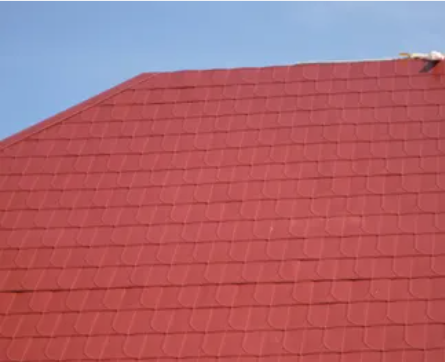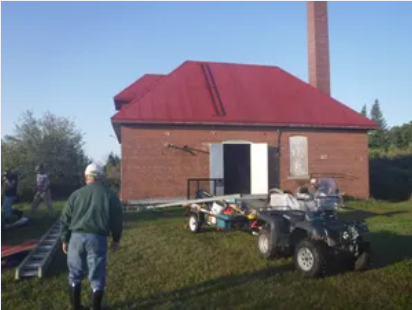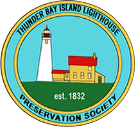Coastie Stories
Coastie Stories:
All of the Coast Guard personnel that manned the Lighthouse in Michigan wintered at Charlevoix, MI Lifeboat Station on Lake Michigan. There were over 50 of us living in a very large house with bunk beds for about 4 months.
There were four of us assigned to Thunder Bay Island Lighthouse. Each of us is on duty for 3 weeks at a time and one week off. Two Boson Mates (one E-9 Chief & one E-6 First Class) and two enginemen (one E-4 Third Class and one E-3 Fireman).
On April 10, 1963, they transported us to Detroit, Michigan, and we boarded a Buoy Tender for the trip to Thunder Bay Island Lighthouse. The island was completely surrounded by ice, and they went in as far as they could (nearest the generator building), and we were put on the ice with our sea bags and supplies for the walk to the island.
Myself and the other Engineman went to the generator building and started the generators. The Boson Mates went to the house and began opening up. All of the toilets were filled with deicing fluid to preserve them from freezing temperatures. Of course, there was no water in the large wooden tank (I believe it was 500 gallons) in the garage area that contained our drinking/bathing/cooking water, so I went with the other Engineman to set up the pump that drew the water from the lake. Had to chop the ice in order to find a place to start pumping the water. The pipes were metal 2-inch pipes in 10-foot sections. That meant dragging them all to the lake behind the lighthouse and screwing them together. We used a gas-powered pull-start pump. This became a regular, every-other-week, a chore for me during the whole year.
We had an AM/FM radio that worked most of the time and a TV that did not work most of the time, and if you got a picture, it was very “Fuzzy” with no selection of channels. Therefore, we did not watch much TV. The telephone line was open all the time, and if you wanted to get a hold of the Lighthouse Keeper in Alpena, you had to yell into the phone to get his attention.
At the Generator Building, we had to monitor a system that transmitted a radio signal in Morse code (the letter K-Da Dit Da). That signal was used by ships to triangulate their position from other signals from Detroit and Mackinaw Island. It was our duty to keep that going 24/7. The Generator building had two engines, and we kept one of them operating at all times for our power on the island. In addition, we gave weather observations like temperature, cloud formations, and wind speeds to the Alpena Lighthouse attendant during the day.
We were all on per diem and paid a monthly amount for our food. When one person was on their week off, they would use their per diem to pay for the weeks groceries. The Chief or Boson would call the grocery list to the Lighthouse Keeper in Alpena, who would purchase the groceries and give them to the person going on duty. He would then transport that person in a truck out to the end of the peninsula across from Thunder Bay Island, which was definitely in the woods.
The person going off duty would take a 14-foot open skiff with (I believe) a 10-horse outboard motor from the boathouse to the peninsula meeting place. All we had was a compass and no cover, and we did it in good and bad weather. We had no radio or other ways to communicate with anyone. The person going on duty would then load the groceries into the boat and head back to the boathouse. Sometimes in bad weather, you would not see the island or the peninsula, and we would just use the compass to find our way and hope and pray we did not get blown too far off course. Because we were all taught good small boating skills, we never had any bad incidents, but there were some anxious moments, especially when the days became colder and the seas were rough.
We had an old jeep on the island as our only way to get around besides walking. There were only two roads, one from the lighthouse to the generating building and one road to the boathouse. The island was covered in dense woods and, for the most part, was not passable without a lot of work clearing the underbrush.
The boathouse was in fair condition, and we kept the boat inside out of the weather, although we had to keep it covered because the walls and rafters were full of nesting birds, and they created a lot of bird droppings. We could also fish from the boathouse, and sometimes we had enough to make a meal for all of us; however, we did not spend a lot of time fishing.
The island was overrun with rabbits. They were everywhere. I trapped a few of them and kept them for a while, but they were so wild that they ended up killing themselves, trying to get out of the pen we built. Those we had for supper. We stopped trying to keep them and just let them run wild. There were no natural predators to keep the population down except for the winter when those predators could get to the island across the frozen lake.
We all took turns cooking the meals and doing chores around the house. Of course, our bedrooms were our responsibility, and they were kept clean and neat at all times. Two of us bunked together in one room, and the Chief and Boson had their own rooms. Our laundry was our own responsibility, and of course, we had no dryer, so we hung the laundry outside the house to dry.
Being the lowest ranking member, I was deligated the tasks of filling the water tank every other weekend and mowing the grass. I also had to go to the Generating Building at night to check the generator and transmitting system, and the road to and from was very dark. The other three were allergic to poison ivy, and the road on both sides was full of it, so they said that they could not walk that road at night for fear that they would touch the poison ivy. I was not allergic to poison ivy.
We had plenty of time to ourselves, and the Chief and Boson tried to make beer, but it was awful and, I think, ended their beer-making days.
We did paint the inside of the lighthouse tower from the circular stairs. That turned out to be a big mess as the reach from the stairs to the walls was a good stretch, and the walls were rough stone. I think the Chief was looking for “busy work” for all of us.
The view from the top of the light was one that I never tired of and spent many of hours looking out at the lake and lakeshore. I always wanted to be up in the lighthouse when we had a storm, but the Chief thought that it was not safe because of the possibility of lightning strikes.
The Chief brought his dog and young son out for a part of the summer, and that afforded us with someone else to talk and have fun with. The Warrant Officer that was responsible for the lighthouse came out to visit us for a few days in July. He and I served aboard a Coast Gard ship (USCGC Kukui) in the Pacific in 1962, so that gave us time to talk about the old times.
Only one time did we have to use the fog signal horn, and it was very loud. Thankfully, It only lasted one day.
In December (don’t remember the date), the Coast Guard Buoy Tender came offshore and took us off the island on the ice. My 4 years we up in January 1964, and I was asked to “ship over” (sign up for another 4 years), But I declined after I was told would have to stay out there for 5 more years before I could transfer out. I loved the Coast Gard life aboard the ship, but the lighthouse duty was way too boring for a 21-year-old. Instead, I signed up for college courses (Youngstown University) near my hometown of Sharon, Pennsylvania.
I would not trade my 8-plus months on Thunder Bay Island for anything. It was a real, one-of-a-kind adventure.
Robert (Bob) Hudspeth, FN US Coast Guard Veteran.
So It Begins!
The fog signal roof project began today, August 2, 2018. We have some photos to share of the tedious process of mobilization. All work on the island takes much more effort than a land based project, but we think it might be interesting for our followers to see just how difficult transporting equipment can be. While it was a rainy day, the wave height wasn’t too bad, but pulling a pontoon loaded with a transport boat and pump jacks can get real interesting! The crew from Meridian Contracting are pros on land and water!
The Victorian metal shingles are now manufactured and awaiting transport from Texas. The Meridian crew are getting the fog signal building prepared for the project. We hope to see the shingles here in Alpena sometime around August 13-15th.



As of today, September 6, 2018






The progress on the fog signal is now focused on the north side which isn’t visible from the webcam shots. The pictures taken recently of the actual shingles that are installed on the roof highlight the design of the metal shingle. They’re beautiful! This project would never have gotten accomplished without the grant support from the Michigan Lighthouse Assistance Program, Besser Foundation, and the undying belief that this light station and it’s role in our maritime history is far too important for it not to be preserved.






Fog Signal exterior roof is completed.

